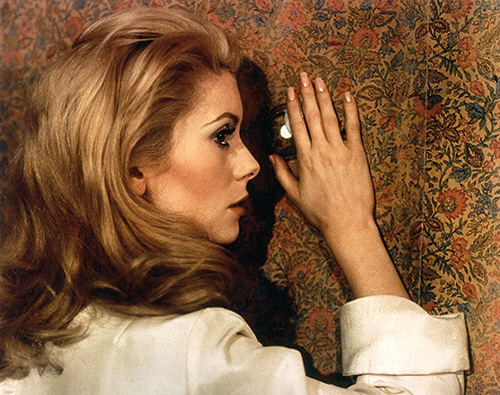At one point in Luis Buñuel’s 1967 film Belle de Jour (spruced up with a new print, now on rerelease) its title character is shown the contents of a small, intricately decorated box by a portly gentleman with a severe crew cut. Belle de Jour is the name that the respectable bourgeois young woman Séverine (played by Catherine Deneuve) has adopted for her day job (one she keeps secret from her husband and the rest of her elevated society): as a prostitute in a high-class brothel in a Paris side street.
The owner of the box is a client, and he lifts its lid to disclose its secrets before commencing business. Throughout the film Deneuve mostly carries an expression of glassy, impenetrable poise, but staring inside that box – its interior remains hidden to us – she loses her cool. A wave of both fascination and horror grips her. What’s inside the box? Asked that question, Buñuel would say to inquisitive viewers: “Whatever you want to be.”
As befits one of the pioneering figures of surrealism, Buñuel wasn’t the kind to explain his art, and his movies are mysterious things that provoke and unsettle and recoil, like crabs into shadowy places under a rock, from the prodding scrutiny of critics.
She enjoys a rich, erotically complicated life, an elaborate concoction of fetishism, S&M and burly coach men
Some things are clear enough. Séverine is married to Pierre (Jean Sorel), a young doctor whose dashing yet conventional good looks seem plucked from a catalogue. It’s a year into a happy marriage, but their bliss is clouded by Séverine’s reluctance to have sex: the two share a room but sleep in separate single beds (like a couple in a 1970s sitcom), and she flinches at his
attempts at intimacy.
But she also enjoys a rich, erotically complicated life, an elaborate concoction of fetishism, S&M and burly coach men (conveyed in the opening scene as she imagines Pierre terminating a romantic horse-drawn ride to ‘punish’ her for her coldness). That hidden side to the ostensibly reserved Séverine is fully expressed when she embarks on her double-life as a prostitute. Run by Madam Anaïs (Geneviève Page), the brothel answers a need in Séverine that’s boldly left open to interpretation.










